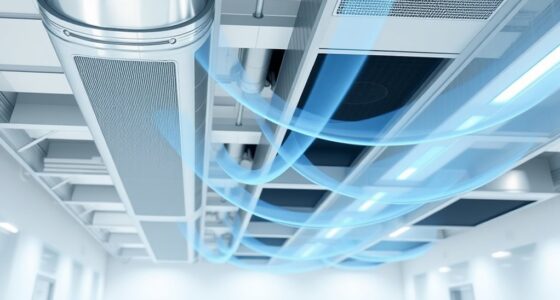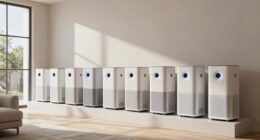Smart HVAC systems use AI and predictive maintenance to keep your indoor environment comfortable and healthy. They monitor components like filters, airflow, and pollutants in real time, detecting issues before they cause problems. These systems adapt to your habits and outdoor conditions, saving energy and lowering bills. By automatically adjusting ventilation and filtration, they improve indoor air quality and guarantee ideal comfort. Explore how these innovations can transform your space for better health and efficiency.
Key Takeaways
- Integrates AI and sensors to monitor HVAC components, enabling proactive identification of potential failures.
- Uses predictive analytics to forecast maintenance needs, reducing emergency repairs and system downtime.
- Continuously analyzes indoor air quality data to automatically adjust ventilation and filtration for healthier environments.
- Learns user habits and weather patterns to optimize system operation, enhancing comfort and energy efficiency.
- Combines security features with IAQ management to ensure system safety while maintaining optimal indoor air conditions.

Have you ever wondered how your heating and cooling systems can become smarter and more efficient? The answer lies in smart HVAC integration, where advanced technology enhances energy efficiency and user comfort simultaneously. By leveraging predictive maintenance and artificial intelligence (AI), your HVAC system can proactively address issues before they escalate, reducing energy waste and ensuring a consistent indoor environment.
Predictive maintenance is a game-changer. Instead of reacting to breakdowns or performance drops after they occur, your system continuously monitors its own components, analyzing data to forecast potential failures. Sensors track temperature fluctuations, airflow, filter condition, and equipment vibrations. AI algorithms then interpret this data, identifying patterns that suggest upcoming malfunctions. This proactive approach means you spend less on emergency repairs and avoid unexpected outages, while your system runs more smoothly and efficiently. As a result, energy consumption decreases because the system avoids unnecessary operation caused by mechanical issues or inefficiencies. You also benefit from improved user comfort, as the system maintains steady indoor temperatures without abrupt fluctuations or noise caused by failing parts.
Predictive maintenance monitors components to prevent failures, reducing energy waste and enhancing indoor comfort seamlessly.
AI-powered smart HVAC systems also optimize energy efficiency by learning your habits and preferences. Over time, they adapt operation schedules, adjusting heating, cooling, and ventilation based on occupancy patterns and external weather conditions. For example, if you usually arrive home at a certain time, the system can pre-condition your space so it’s comfortable when you walk in, without wasting energy throughout the day. This personalized approach ensures that your environment feels just right while conserving energy, translating into lower utility bills and a smaller carbon footprint.
Furthermore, these systems incorporate advanced air quality monitoring, giving you real-time insights into indoor pollutants, humidity levels, and allergen presence. AI algorithms analyze this data to automatically adjust ventilation rates and filtration, improving indoor air quality (IAQ). Maintaining optimal IAQ not only boosts your health but also enhances overall comfort, especially for those with sensitivities or respiratory issues. Additionally, integrating security features can help safeguard your home from unauthorized access while optimizing system performance. With smart integration, your HVAC system becomes an active participant in creating a healthier, more comfortable living or working space.
In essence, smart HVAC systems powered by predictive maintenance and AI transform how you experience indoor climate control. They deliver better energy efficiency by minimizing waste and ensuring your system works at its best. At the same time, they prioritize user comfort, adapting to your needs and maintaining excellent indoor air quality. This synergy of technology and comfort makes your space more sustainable, healthier, and more enjoyable to live or work in.
Frequently Asked Questions
How Does AI Improve Indoor AIr Quality in Smart HVAC Systems?
AI improves your indoor air quality by analyzing data from advanced sensor technology to detect pollutants, humidity, and temperature changes in real-time. It actively adjusts ventilation, filtration, and humidity levels to maintain ideal air conditions. This proactive approach ensures cleaner air, reduces allergens, and prevents mold growth, creating a healthier environment. With AI, your smart HVAC system continuously optimizes indoor air quality, making your space more comfortable and safer.
What Are the Cost Implications of Implementing Predictive Maintenance?
Implementing predictive maintenance involves upfront installation costs for sensors and AI software, but it can lower long-term maintenance expenses by preventing costly breakdowns. You might face higher initial investments, yet these can reduce emergency repairs and extend equipment lifespan. Overall, while the initial costs are higher, the savings in maintenance expenses and improved system efficiency often make it a worthwhile investment over time.
Can Smart HVAC Systems Adapt to Seasonal Climate Changes Automatically?
Yes, smart HVAC systems can automatically adapt to seasonal adjustments through climate responsiveness features. They analyze data from sensors to optimize heating and cooling based on changing weather conditions, ensuring efficient performance. By adjusting settings in real-time, these systems maintain comfort and improve energy efficiency across seasons. This automatic adaptation reduces manual intervention and helps you save on energy costs while ensuring consistent indoor air quality.
How Secure Is Data Collected by Ai-Enabled HVAC Systems?
You might think AI-enabled HVAC systems are vulnerable, but they’re actually quite secure. Data privacy is a top priority, with robust cybersecurity safeguards in place to protect your information. Manufacturers implement encryption, regular updates, and secure access controls to prevent breaches. While no system is completely invulnerable, these measures considerably reduce risks, ensuring your data remains safe while enjoying the benefits of smart, efficient climate control.
What Are the Environmental Benefits of Ai-Integrated HVAC Solutions?
AI-integrated HVAC solutions help you substantially reduce energy consumption by optimizing heating and cooling based on real-time data. This leads to greater energy conservation and less reliance on fossil fuels. As a result, you contribute to greenhouse gas reduction, improving air quality and combating climate change. By adopting these smart systems, you support a healthier environment while enjoying lower energy bills and increased system efficiency.
Conclusion
By integrating smart HVAC systems with predictive maintenance and AI, you can optimize indoor air quality effortlessly. These technologies help catch issues early, saving time and money while keeping your environment comfortable. Remember, a stitch in time saves nine—investing in smart solutions today guarantees a healthier, more efficient space tomorrow. Stay proactive, embrace innovation, and let technology work for you to create the perfect indoor climate.









